#Overcoming Constraints
Explore tagged Tumblr posts
Text
The True Essence of Freedom
We all crave freedom and believe it's our right, but true freedom requires effort, ownership, and accountability. Freedom spans across various aspects of life—your body, beliefs, thoughts, values, relationships, and finances.
Unfortunately, it’s easy to feel trapped in any of these areas—like you’ve lost control or external forces are against you. To truly value freedom, you need to stay in the driver’s seat of your life.
Freedom is not free.
To feel free in your body, you must make daily sacrifices. Master the art of delayed gratification—invest in your health now to reap the rewards later. It might sound militant, but it’s the truth. Those who feel free in their health have earned it through consistency and confidence. On the other hand, those who neglect their health pay a greater price later, both physically and mentally.
Living in a free country doesn’t mean you are truly free.
You aren’t free unless you practice freedom. If you don’t pursue it physically, mentally, financially, and spiritually, you’ll end up constrained or imprisoned in some area of your life.
This is the freedom paradigm. When we take freedom for granted, it eventually constrains us.
For example, many people feel financially trapped due to inflation—not because of their actions but because they were passive. They didn’t protect their purchasing power or educate themselves about the changing environment. Now they’re financially trapped, losing hope for the future as their savings dwindle.
Financial freedom is an illusion unless you actively create it.
The same applies to physical health and wellbeing. It’s your birthright, but it’s not free. To feel free in your body, you must continually invest in your health and wellness—it comes at a cost. If you don’t pay that cost, you’ll eventually feel confined in your own body.
Emotional freedom isn’t free either. You need to create an atmosphere that fosters emotional happiness. Society and mainstream media often create an environment that breeds fear and anxiety.
Emotional freedom requires surrounding yourself with positive influences, uplifting messages, and tools that build self-confidence and inspire greatness. This is the opposite of emotional confinement, which leaves you feeling depleted and helpless.
Spiritual freedom is equally important. Cultivating faith and connecting to a higher power opens the door to grace and divine intervention, enhancing our sense of freedom.
Spiritual and emotional well-being significantly impact our ability to cultivate freedom in our lives.
But again, freedom is not free. To be truly free, take control of your life. Build a stronger version of yourself physically, mentally, emotionally, spiritually, and financially.
It takes courage, belief, and pursuit—but it’s worth it.
I want you to BE free and FEEL free.
Whatever constraints are holding you back, take action today to tear down those walls. Do it for yourself, your loved ones, and for the good of humanity. Live, love, and value FREEDOM.
helping people build a freedom based business. Retire Thrive Explore, live free. http://freedom.andrewplimmer.com
#Freedom#Personal Autonomy#Health and Wellness#Mental Well-being#Financial Freedom#Spiritual Growth#Emotional Health#Self-Improvement#Life Purpose#Overcoming Constraints
3 notes
·
View notes
Text
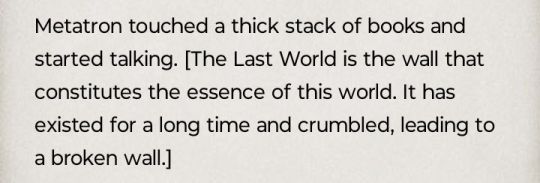
the walls in orv are often discussed as either character metaphors (ie. the fourth wall as dissociation, or the wall of impossible communication as connection) or as the themes they embody, but it's important to note here what they can represent metanarratively too. the final wall itself symbolizes the constraints of the text - the fact that a story has to exist on a page and within the covers of a book in order to exist at all, regardless of how much that might limit the scope of its ability to tell the story. of course, that's not all a story is, but its existence at a base level is dependent on those limits.
themes in a story can work as defining limitations, too. a story is focused on certain ideas, and that's what allows it to be what it is. that's why the pieces of the final wall are thematic & character symbols - those are a crucial part of what defines a story!
#nic's great orv reread#the metanarrative tension btwn needing to escape the constraints of a text to be truly free AND the fact that those constraints define a txt#is something i think abt quite often!#if you're creating metafiction that has the thematic goal of 'overcoming' the script you're going to have to have a pretty clear idea#of how that might even be possible#orv has its answer - the constraint is overcome by the perception of the reader#and the story's ability to exist in the reader's mind beyond mere letters on a page#(as an aside this train of thought always makes me wonder how deltarune will handle this aspect of its metafiction-#-since it also has themes of overcoming the roles and scripts placed on the characters in it)
21 notes
·
View notes
Text
Are you or your team held back by invisible barriers?
Often, the strongest chains aren’t physical but psychological—built from past experiences, early programming, and self-limiting beliefs. Understanding how these constraints form and learning to dismantle them can unlock unprecedented potential for leaders and their teams.
In my latest blog, "Unleashing Potential – Breaking Free from Self-Imposed Barriers," I explore how artificial constraints shape our behavior and offer actionable insights on how to overcome them. Let's move beyond limitations and step confidently into growth.
Ready to lead without limits?
#Personal Growth#Leadership Development#Psychological Safety#Self-Imposed Barriers#Limiting Beliefs#Artificial Constraints#Environmental Impact#Overcoming Obstacles#Leadership Potential#Jerry Justice#TAImotivations
0 notes
Text
Who broke the internet?
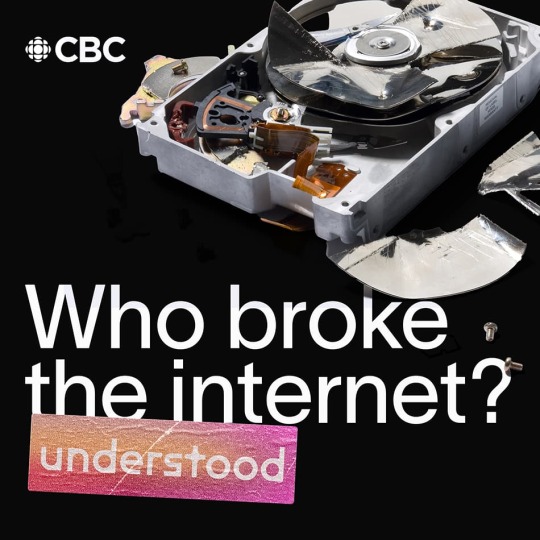
I'm on a 20+ city book tour for my new novel PICKS AND SHOVELS. Catch me in PITTSBURGH on May 15 at WHITE WHALE BOOKS, and in PDX on Jun 20 at BARNES AND NOBLE with BUNNIE HUANG. More tour dates (London, Manchester) here.

"Who Broke the Internet?" is a new podcast from CBC Understood that I host and co-wrote – it's a four-part series that explains how the enshitternet came about, and, more importantly, what we can do about it. Episode one is out this week:
https://www.cbc.ca/listen/cbc-podcasts/1353-the-naked-emperor/episode/16144078-dont-be-evil
The thesis of the series – and indeed, of my life's work – is that the internet didn't turn to shit because of the "great forces of history," or "network effects," or "returns to scale." Rather, the Great Enshittening is the result of specific policy choices, made in living memory, by named individuals, who were warned at the time that this would happen, and they did it anyway. These wreckers are the largely forgotten authors of our misery, and they mingle with impunity in polite society, never fearing that someone might be sizing them up for a pitchfork.
"Who Broke the Internet?" aims to change that. But the series isn't just about holding these named people accountable for their enshittificatory deeds: it's about understanding the policies that created the enshittocene, so that we can dismantle them and build a new, good internet that is fit for purpose, namely, helping us overcome and survive environmental collapse, oligarchic control, fascism and genocide.
The crux of enshittification theory is this: tech bosses made their products and services so much worse in order to extract more rents from end-users and business customers. The reason they did this is because they could. Over 20+ years, our policymakers created an environment of impunity for enshittifying companies, sitting idly by (or even helping out) as tech companies bought or destroyed their competitors; captured their regulators; neutered tech workers' power; and expanded IP laws to ensure that technology could only ever be used to attack us, but never to defend us.
These four forces – competition, regulation, labor power and interoperability – once acted as constraints, because they punished enshittifying gambits. Make your product worse and users, workers and suppliers would defect to a competitor; or a regulator would fine you or even bring criminal charges; or your irreplaceable workers would down tools and refuse to obey your orders; or another technologist would come up with an alternative client, an ad-blocker, a scraper, or compatible spare parts, plugins or mods that would permanently sever your relationship with whomever you were tormenting.
As these constraints fell away, the environment became enshittogenic: rather than punishing enshittification, it rewarded it. Individual enshittifiers within companies triumphed in their factional struggles with corporate rivals, like the Google revenue czar who vanquished the Search czar, deliberately worsening search results so we'd have to repeatedly search to get the answers we seek, creating more opportunities to show us ads:
https://www.wheresyoured.at/the-men-who-killed-google/
An enshittogenic environment meant that individuals within companies who embraced plans to worsen things to juice profits were promoted, displacing workers and managers who felt an ethical or professional obligation to make good and useful things. Top tech bosses – the C-suite – went from being surrounded by "adult supervision" who checked their worst impulses with dire warnings about competition, government punishments, or worker revolt to being encysted in a casing of enthusiastic enshittifiers who competed to see who could come up with the most outrageously enshittificatory gambits.
"Who Broke the Internet?" covers the collapse of all of these constraints, but its main focus is on IP law – specifically, anticircumvention law, which bans technologists from reverse-engineering and modifying the technologies we own and use (AKA "interoperability" or "adversarial interoperability").
Interoperability is at the center of the enshittification story because interop is an unavoidable characteristic of anything built out of computers. Computers are, above all else, flexible. Formally speaking, our computers are "Turing-complete universal von Neumann machines," which is to say that every one of our computers is capable of running every valid program.
That flexibility is why we call computers a "general purpose" technology. The same computer that helps your optometrist analyze your retina can also control your car's anti-lock braking system, and it can also play Doom.
Enshittification runs on that flexibility. It's that flexibility that allows a digital products or service to offer different prices, search rankings, recommendations, and costs to every user, every time they interact with it:
https://pluralistic.net/2023/02/19/twiddler/
It's that flexibility that lets tech companies send over-the-air "updates" to your property that takes away functionality you paid for and valued, and then sell it back to you as an "upgrade" or worse, a monthly subscription:
https://pluralistic.net/2023/10/26/hit-with-a-brick/#graceful-failure
But that flexibility cuts both ways. The fact that every computer can run every valid program means that every enshittificatory app and update, there's a disenshittificatory program you could install that would reverse the damage. For every program that tells your HP printer to reject third-party ink, forcing you to buy HP's own colored water at $10,000/gallon, there's another program that tells your HP printer to enthusiastically accept third-party ink that costs mere pennies:
https://www.eff.org/deeplinks/2020/11/ink-stained-wretches-battle-soul-digital-freedom-taking-place-inside-your-printer
In other worse, show me a 10-foot enshittifying wall, and I'll show you an 11-foot disenshittifying ladder.
Interoperability has long been technology's most important disenshittifier. Interop harnesses the rapaciousness of tech bros and puts it in service to making things better. Someone who hacks Instagram to take out the ads and recommendations and just show you posts from people you follow need not be motivated by the desire to make your life better – they can be motivated by the desire to poach Instagram users and build a rival business, and still make life better for you:
https://www.digitaltrends.com/mobile/the-og-app-instagram-alternative-ad-free/
And if they succeed and then recapitulate the sins of Instagram's bosses, turning the screws on users with ads, suggestions and slop? That just invites more disenshittifying interoperators to do unto them as they did unto Zuck.
That's the way it used to work: the 10-foot piles of shit deployed by tech bosses conjured up 11-foot ladders. This is what disruption is, when it is at its best. There's nothing wrong with moving fast and breaking things – provided the things you're breaking belong to billionaire enshittifiers. Those things need to be broken.
Enter IP law. For the past 25+ years, IP law has been relentlessly expanded in ways that ensure that disruption is always for thee, never me. "IP" has come to mean, "Any law that lets a dominant company reach out and exert control over its critics, competitors and customers":
https://locusmag.com/2020/09/cory-doctorow-ip/
The most pernicious IP law is far and away "anticircumvention." Under anticircumvention, it is illegal to "break a digital lock" that controls access to a copyrighted work, including software (and digital locks are software, so any digital lock automatically gets this protection).
This is mind-bending, particularly because it's one of those things that's so unreasonable, so very, very stupid that it's easy to think you're misunderstanding it, because surely it can't be that stupid.
But oh, it is.
One of the best ways to grasp this point is to start with what you might do in a world without digital locks. Take your printer: if HP raises the price of ink, you might start to refill your cartridges or buy third-party cartridges. Obviously, this is not a copyright violation. Ink is not a copyrighted work. But once HP puts a digital lock on the printer that checks to see if you've done an end-run around the HP ink ripoff, then refilling your cartridge becomes illegal, because you have to break that digital lock to get your printer to use the ink you've chosen.
Or think about cars: taking your car to your mechanic does not violate anyone's copyright. If your car, you decide who fixes it. But all car makers use digital locks to prevent mechanics from reading out the diagnostic information they need to access to fix your car. If a mechanic wants to know why your check engine light has turned on, they have to buy a tool – spending 5-figure sums every year for every manufacturer – in order to decode that error. Now, it's your car, and error messages aren't copyrighted works, but bypassing the lock that prevents independent diagnosis is a crime, thanks to anticircumvention law.
Then there's app stores. You bought your console. You bought your phone. These devices are your property. If I want to sell you some software I've written so you can run it on your device, that's not a copyright violations. It is the literal opposite of a copyright violation: an author selling their copyrighted works to a customer who gets to enjoy those works using their own property. But the digital lock on your iPhone, Xbox, Playstation and Switch all prevent your device from running software unless it is delivered by the manufacturer's app store, which takes 30 cents out of every dollar you spend. Installing software without going through the manufacturer's app store requires that you break the device's digital lock, and that's a crime, which means that buying a copyrighted work from its author becomes a copyright violation!
This is what Jay Freeman calls "felony contempt of business model." We created laws – again, in living memory, thanks to known individuals – that had the foreseeable, explicit intent of making it illegal to disenshittify the products and services you rely on. We created this enshittogenic environment, and we got the enshittocene.
That's where "Who Broke the Internet?" comes in. We tell the story of Bruce Lehman, who was Bill Clinton's IP czar. Anticircumvention was really Lehman's brainchild, and he had a plan to make it the law of the land. When Al Gore was overseeing the demilitarization of the internet (the "Information Superhighway" proceedings), Lehman pitched this idea to him as the new rules of the road for the internet. To Gore's eternal credit, he flatly rejected Lehman's proposal as the batshit nonsense it plainly was.
So Lehman scuttled to Switzerland, where a UN agency, the World Intellectual Property Organization (WIPO) was crafting a pair of new treaties to create a global system of internet regulation. Lehman lobbied the national delegations to WIPO to put anticircumvention in their treaties, and he succeeded – partially. WIPO is a very bad agency, since the majority of delegations that are sent to Geneva by the world's nations come from poor countries in the global south, and they're made up of experts in things like water, agriculture and child health. The vast majority of national reps at WIPO are not experts in IP, and they are often easy prey for fast-talking lobbyists from US-based media, pharma and tech companies, as well as the US government reps who carry their water.
But even at WIPO, Lehman's proposal was viewed as far too extreme. In the end, the anticircumvention rules embedded in the WIPO treaties are much more reasonable than Lehman's demands. Under the WIPO treaty, signatories must pass laws that make copyright infringement extra illegal if you have to break a digital lock on the way. But if you break a lock and you don't infringe copyright (say, because you refilled a printer cartridge, took your car to an independent mechanic, or got some software without using an app store), then you're fine.
Lehman's next move was to convince Congress that they needed to pass a version of the anticircumvention rule that went far beyond the obligations in the WIPO treaties. In this, he was joined by powerful, deep-pocketed lobbyists from Big Content, and later, Big Tech. They successfully pressured Congress into passing Section 1201 of the Digital Millennium Copyright Act in 1998 – a law that protects digital locks, at the expense of copyright and the creative workers whom copyright is said to serve.
Lehman has repeatedly, publicly described this maneuver as "doing an end-run around Congress." Once America adopted this extreme anticircumvention rule, the US Trade Representative made it America's top priority to ram identical laws through the legislatures of all of America's trading partners, under the explicit or tacit threat of tariffs on any country that refused (the information minister of a Central American country once told me that the USTR threatened them, saying that if they didn't accept anticircumvention as a clause in the Central American Free Trade Agreement – CAFTA – they would lose their ability to export soybeans to America).
Canada took more than a decade to enact its own version of the anticircumvention rule, which was the source of public outrage by the USTR and US industry lobbyists. These neocolonialists found plenty of Parliamentary sellouts willing to introduce laws on their behalf, but every time this happened, the Canadian people reacted with a kind of mass outrage that had never been seen in response to highly technical proposals for internet regulation. For example, the Liberal MP Sam Bulte was challenged on her support of the rule by her Parkdale constituents at a public meeting, and had a screeching meltdown, screaming that she would not be "bullied by user-rights zealots and EFF members." Voters put "User-Rights Zealot" signs on their lawns and voted her out of office.
Anticircumvention remained a priority for the US, and they found new MPs to do their dirty work. Stephen Harper's Conservatives made multiple tries at this. After Jim Prentice utterly failed to get the rule through Parliament, the brief was picked up by Heritage Minister James Moore (who liked to call himself "the iPad Minister") and now-disgraced Industry minister Tony Clement. Clement and Moore tried to diffuse the opposition to the proposal by conducting a public consultation on it.
This backfired horribly. Over 6,000 Canadians wrote into the consultation with individual, detailed, personal critiques of anticircumvention, explaining how the rule would hurt them at work and at home. Only 53 submissions supported the rule. Moore threw away these 6,130 negative responses, justifying it by publicly calling them the "babyish" views of "radical extremists":
https://pluralistic.net/2024/11/15/radical-extremists/#sex-pest
Named individuals created policies in living memory. They were warned about the foreseeable outcomes of those proposals. They passed them anyway – and then no one held them accountable.
Until now.
The point of remembering where these policies came from isn't (merely) to ensure that these people are forever remembered as the monsters they showed themselves to be. Rather, it is to recover the true history of enshittification, the choices we made that led to enshittification, so that we can reverse those policies, disenshittify our tech, and give rise to a new, good internet that's fit for the purpose of being the global digital nervous system for a species facing a polycrisis of climate catastrophe, oligarchy, fascism and genocide.
There's never been a more urgent moment to reconsider those enshittificatory policies – and there's never been a more auspicious moment, either. After all, Canada's anticircumvention law exists because it was supposed to guarantee tariff-free access to American markets. That promise has been shattered, permanently. It's time to get rid of that law, and make it legal for Canadian technologists to give the Canadian public the tools they need to escape from America's Big Tech bullies, who pick our pockets with junk-fees and lock-in, and who attack our social, legal and civil lives with social media walled gardens:
https://pluralistic.net/2025/01/15/beauty-eh/#its-the-only-war-the-yankees-lost-except-for-vietnam-and-also-the-alamo-and-the-bay-of-ham
"Understood: Who Broke the Internet" is streaming now. We've got three more episodes to go – part two drops on Monday (and it's a banger). You can subscribe to it wherever you get your podcasts, and here's the RSS feed:
https://www.cbc.ca/podcasting/includes/nakedemperor.xml

If you'd like an essay-formatted version of this post to read or share, here's a link to it on pluralistic.net, my surveillance-free, ad-free, tracker-free blog:
https://pluralistic.net/2025/05/08/who-broke-the-internet/#bruce-lehman
#pluralistic#cbc#podcasts#enshittification#audio#mp3s#canada#cancon#bruce lehman#anticircumvention#dmca 1201#understood
588 notes
·
View notes
Text
Let's talk about killing off characters.
Killing off characters is a dramatic device often used to advance the plot, create tension, or evoke emotional responses from readers or viewers. We love doing it. The initial shock, the mourning after. The effects of it on the other characters. It's fun.
Nevertheless, you can still achieve the desired impact on your plot and characters without necessarily resorting to fictional murder.
Here are some alternatives to drive the plot forward:
Character transformation: Instead of killing off a character, you can have them undergo significant personal growth or change. This could involve overcoming challenges, facing moral dilemmas, or undergoing a shift in beliefs or values. Their transformation can still drive the plot forward and impact other characters. (I especially love it when the transformation is negative—like when a traumatic experience of some sort completely strips a character of their soul. But that's a sentiment for another day.)
Betrayal or conflict: Introduce betrayal or conflict between characters that challenges relationships and creates tension. This can lead to significant plot developments and character arcs without resorting to death. And it can be cause for quite a lot of angst.
Separation or estrangement: Have characters physically or emotionally separated from each other, causing tension and driving the plot forward as they strive to reconnect or deal with the consequences of their estrangement.
Sacrifice without death: Characters can make significant sacrifices that don't necessarily involve their death. This could be sacrificing personal goals, relationships, or values for the greater good or to achieve a specific objective.
Injury or disability: Instead of killing off a character, you can incapacitate them through injury or disability. This will create challenges for the character and those around them, leading to character development and plot progression as they're forced to adapt to their new circumstances.
Redemption arcs: Characters who have committed wrongdoings can undergo redemption arcs where they seek forgiveness, make amends, or strive to become better individuals. This can drive the plot forward while also adding depth to the character. Keep in mind that this may not be a suitable alternative to death for some characters—for instance, the protagonist forgiving their abusive parent despite all they were forced to go through may evoke a sense of indignation rather than admiration for their supposed selflessness.
Revelations or secrets: Introduce revelations or uncover secrets that have significant impacts on characters and their relationships. This can lead to conflict, tension, and plot twists without the need for death.
Forced alliances or unexpected partnerships: Characters can be forced into alliances or partnerships with unlikely allies, leading to interesting dynamics and plot developments as they navigate these new relationships.
Loss of power or status: Characters can experience a loss of power, status, or reputation, which can drive the plot forward as they strive to regain what they've lost, seek revenge on those responsible, or adapt to their new circumstances.
Time constraints or pressure: Introduce time constraints or pressure situations that force characters to act quickly and make difficult, split-second decisions that may end up being quite regrettable later on. This can raise conflicts of who's to blame, or what should have been done.
I feel like I strayed off a little, but there you have it. Hope this was helpful! ❤
Previous | Next
#writeblr#writing#writing tips#writing advice#writing help#writing resources#creative writing#plot development#plot device#torturing my characters#deception-united
1K notes
·
View notes
Text
Dream-world information/rules (by request): interestingly, the dreamworlds are possibly teaching the dreamers how it feels to be Malleus:
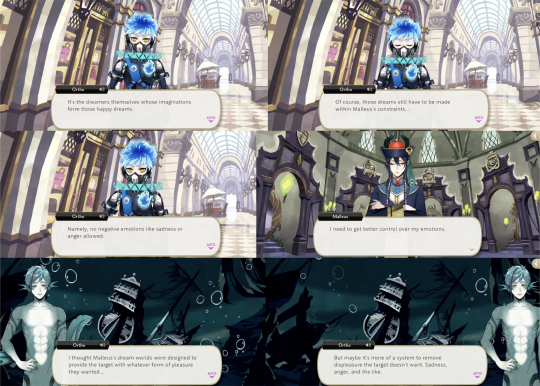

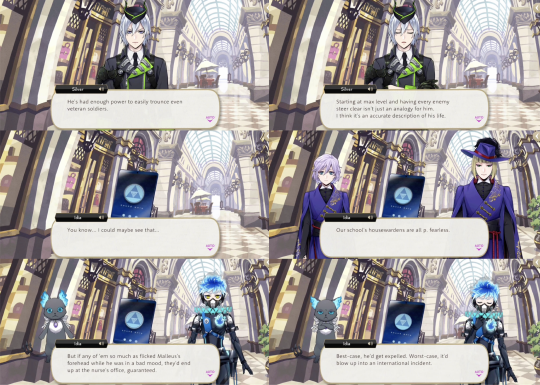
Ortho: “It's the dreamers themselves whose imaginations form those happy dreams. Of course, those dreams still have to be made within Malleus's constraints…namely, no negative emotions like sadness or anger allowed.”
And there is someone else who is not allowed to feel any emotions like sadness or anger, lest something terrible happen 🐉
Ortho: "I thought Malleus's dream worlds were designed to provide the target with whatever form of pleasure they wanted...But maybe it's more of a system to remove displeasure the target doesn't want. Sadness, anger, and the like.”
And this is not just speculation, with Sebek and Silver coming to the same conclusion:
Idia: “It's like playing a video game where you start at max level and every enemy steers clear of you. There's no losing and retrying. No trial and error to overcome obstacles. The challenge and payoff of getting good is what truly makes gaming rewarding.” Silver: “In Malleus's case...I think in terms of encountering rewarding challenges, his experience is extremely limited. Ever since he was born…or even before then..he's had enough power to easily trounce even veteran soldiers. Starting at max level and having every enemy steer clear isn't just an analogy for him. I think it's an accurate description of his life.”
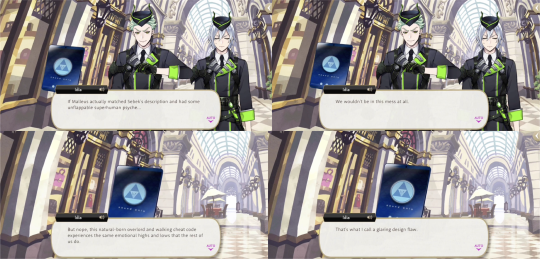
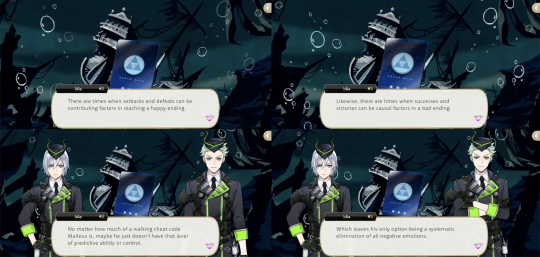
Idia follows with:
"If Malleus actually matched Sebek's description and had some unflappable superhuman psyche…we wouldn't be in this mess at all. But nope, this natural-born overlord and walking cheat code experiences the same emotional highs and lows that the rest of us do. That's what I call a glaring design flaw.” “There are times when setbacks and defeats can be contributing factors in reaching a happy ending. Likewise, there are times when successes and victories can be causal factors in a bad ending. No matter how much of a walking cheat code Malleus is, maybe he just doesn't have that level of predictive ability or control. Which leaves his only option being a systematic elimination of all negative emotions.”
Malleus has never experienced setbacks or defeats, so he has no frame of reference for happiness that derives from them.
It is beyond Malleus’ ability to imagine, and we have seen the dreams limited by Malleus’ imagination before: Lilia’s, where Malleus was unable to interfere in a timeline before his own birth.
Silver: "What if Malleus has trouble controlling things he doesn't know about and can't imagine...?"

We are still learning the rules of the dreams as the characters themselves do not understand what is happening and are providing us with information through trial and error, and there is still more, very important information to come on EN (memo: this post will need to be updated📝).
But here are some of the rules!


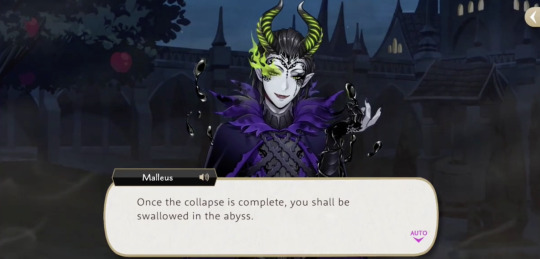
1. Dreams break down when a happy ending becomes impossible, at which point everything is swallowed into an abyss (hence the name of Book 7 in the original game: Lord of the Abyss)
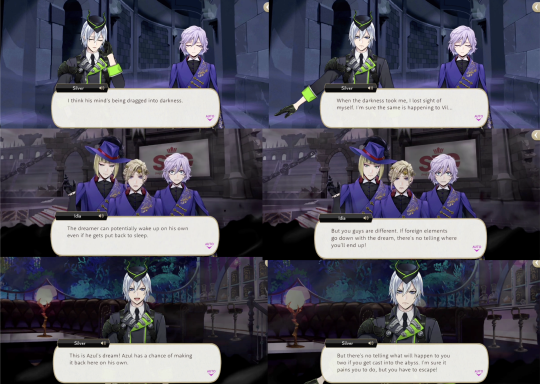

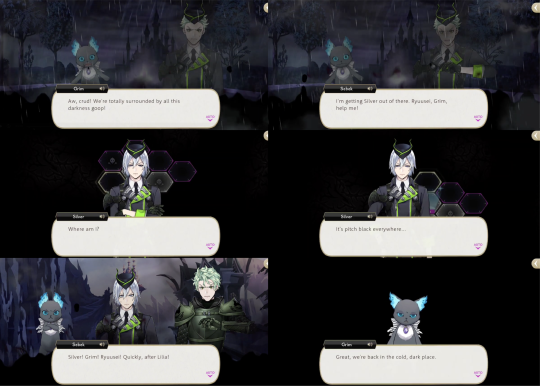
2. Idia says that once swallowed by the abyss the dreamer can potentially wake up on their own but there is no telling what may happen to foreign elements
(we have possibly seen successful examples of “foreign elements” being swallowed into the abyss and surviving, with both Silver and Lilia having their abysses invaded by others, but Idia has not)

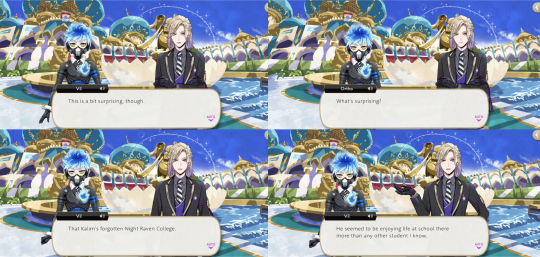
3. The “happiness” in the dreams is superficial, as though following the vague order of “keep dreaming happy dreams,” possibly due to Malleus’ inability to imagine what happiness is.
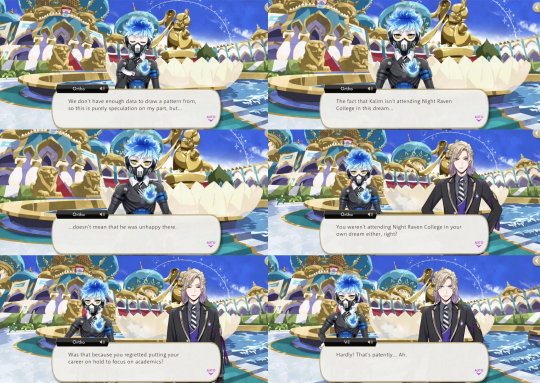
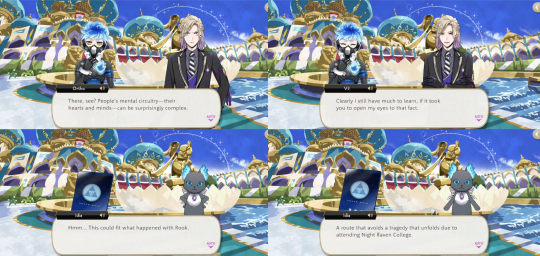
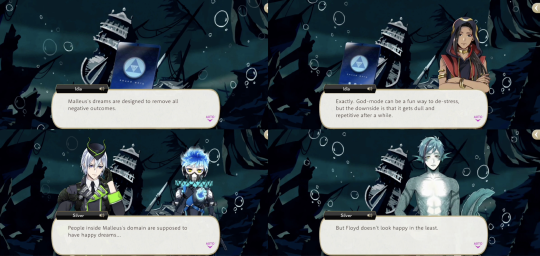
4. Despite the “superficial” nature of the dreams, Ortho explains that “people’s mental circuity—their hearts and minds—can be surprisingly complex,” resulting in the dreams coming up with creative ways to please the dreamers
(Example: Kalim attending a school that isn’t NRC not because he is unhappy at NRC and Rook dreaming of NRC without Vil not because he wants Vil out, but because they were both avoiding tragedies that happened there.)

5. People who shares lots of memories with a dreamer have a better likelihood of helping them wake up

6. When a dreamer is about to wake, NPCs will try to keep them inside.
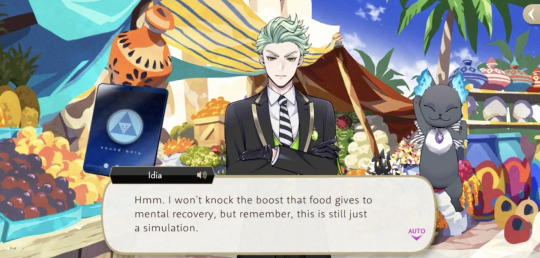
7. It is possible that consuming food in a dream aids in mental recovery

8. It is possible to run out of breath through exertion and feel pain when hit in a dream

9. Malleus is possibly keeping the stronger mages under tighter surveillance than others, with Idia and Vil being constantly attended by their dreams “GM” (human-Ortho for Idia, Neige for Vil)
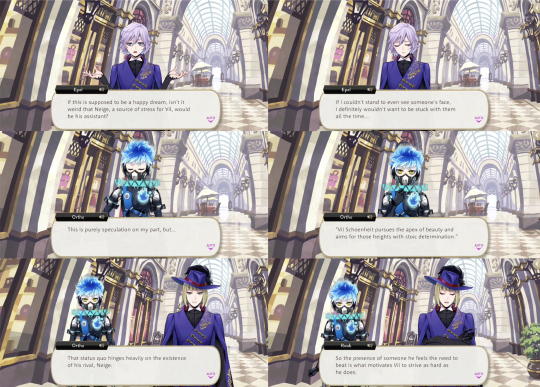
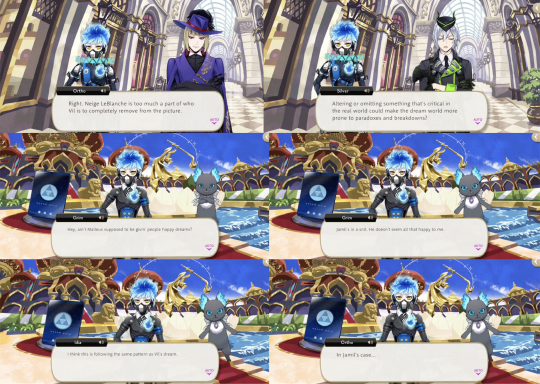
10. In instances where a real-world source of negativity is too much a part of who the dreamer is to separate them, their absence is likely to cause paradoxes and dream-breakdowns.
The dreams adapt to this by rewriting the source of stress into something less offensive: a bumbling assistant version of Neige who could never hope to rival Vil and a more polite and humble version of Kalim for Jamil.
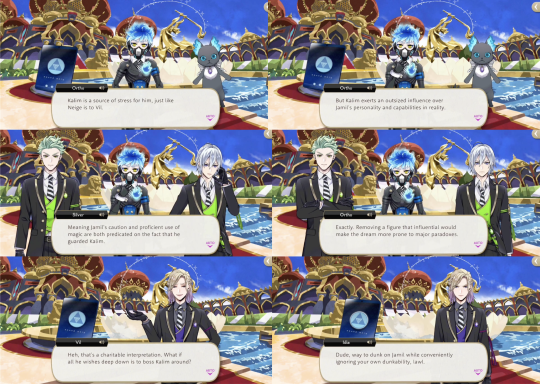

To Be Continued ♪
266 notes
·
View notes
Text
Character motivations for fictional characters
1. Revenge: Seeking vengeance for a past wrong or harm.
2. Power: Craving dominance and control over others.
3. Love and Relationships: Longing for love, companionship, and emotional connection.
4. Redemption: Seeking to atone for past mistakes and find forgiveness.
5. Survival: Striving to stay alive in dangerous or challenging circumstances.
6. Justice: Fighting against injustice and upholding fairness.
7. Exploration: Satisfying curiosity and a desire for discovery.
8. Ambition: Relentlessly pursuing success and achievement.
9. Freedom: Seeking liberation from oppression and constraints.
10. Knowledge and Wisdom: Thirsting for knowledge, understanding, and wisdom.
11. Family: Protecting and nurturing one's family and loved ones.
12. Acceptance: Craving acceptance and validation from others.
13. Friendship: Building and maintaining meaningful friendships.
14. Escape: Seeking to break free from a stifling or undesirable situation.
15. Truth: Uncovering the truth and exposing lies or deceit.
16. Creativity: Expressing oneself and bringing imagination to life.
17. Competition: Striving to be the best and outperform others.
18. Self-Discovery: Embarking on a journey to understand oneself better.
19. Healing: Seeking emotional, physical, or spiritual healing.
20. Faith and Belief: Holding strong religious or spiritual convictions.
21. Mentorship: Guiding and inspiring others to reach their potential.
22. Revolution: Fighting against oppressive systems and advocating for change.
23. Sacrifice: Putting others' needs above one's own and making difficult choices.
24. Fear: Overcoming fears and finding strength in the face of adversity.
25. Fame: Desiring recognition, acclaim, and celebrity status.
26. Identity: Discovering and understanding one's true self.
27. Empathy: Understanding and connecting with others' emotions and experiences.
28. Tradition: Upholding cultural or familial traditions and values.
29. Rebellion: Resisting authority and challenging the status quo.
#writing#writing tips#writer on tumblr#writerscommunity#character development#writer tumblr#writblr#writing advice#oc character#writing help#fictional characters#character motivation#writing ideas#writeblr#writer problems
4K notes
·
View notes
Note
Sleepy sex with lorenzo 🫠

lorenzo stumbles into his dorm room, smiling softly to himself when he sees you sound asleep in his bed. after the endless drills that draco made him run through tonight, enzo was more than ready to join you. careful not to disturb you, he places his broom and bag in the corner of the room before drawing the sheets back.
his heart swells when he sees you wearing one of his jumpers, the hem of it skimming your bare legs. enzo quietly crawls in next to you, tugging you close until your back is pressed against his chest. his still damp hair tickles your cheek as he rests his chin in the crook of your neck, blinking sleepily as he breathes in your familiar scent.
humming, enzo caresses your thighs, marveling at the soft and supple skin. his big hands move to cup your ass, gently squeezing before he places you right over his front, the bulge in his sweats growing harder by the minute. your boyfriend trails hot and needy kisses along your neck as he grinds his erection against your ass, breathing heavily as he fondles you.
his breathing grows ragged as he cups your tits, massaging the soft tissue before twisting your nipples. enzo leans over to see that you're still sound asleep, none the wiser to his sinful intentions. you look so innocent and peaceful, your face buried in his pillow while you snore softly. seeing you in such a vulnerable state, entirely at his mercy, makes all the blood in his body rush straight to his cock.
despite how tired he is, despite how depraved it is, enzo just can't help himself. before he can think better of it, your boyfriend palms you over your panties, groaning when he feels you soaking through the fabric. cursing, he pulls the fabric to the side before teasing along your slit with his middle finger. your pussy is wet and warm, your body reacting to him even whilst unconscious. his finger sinks in easily, the tightness of your walls suctioning him in, making him moan as he adds another. you stir as he curls his fingers within your gummy walls, feeling you soak him with your arousal.
"en—enz, is that you?"
"shh, it's okay, honey. you're just dreaming." enzo cooes soothingly into your ear, placating you as he tugs his sweatpants down. "go back to sleep, my love."
freed from the constraints, his throbbing cock slaps against his stomach and smears his abs with precum. enzo guides your hand over his hard length, watching in awe as you stroke him. your eyes are half-closed, but the muscle memory takes over as you jerk him off, murmuring his name ever so softly.
enzo is aching, his head is spinning, he feels as though he'll die if he delays another second of feeling your velvety walls hugging around him like a lover's embrace. he wanted — no — he needed to be inside of you right now.
your boyfriend doesn't waste another second. enzo grunts as he pushes the tip of his cock at your entrance, parting your folds while you clench and squeeze around him. merlin, it feels like fucking heaven as he sinks in, his eyes nearly rolling to the back of his head as you take inch after inch. enzo nearly chokes when he's finally fully sheathed, filling you to the brim.
"you don't know what you do to me, pretty girl," enzo says shakily. "I missed you so fucking much. just need to feel you, baby."
slowly, he pulls out before slamming back in again. and again. and again.
the dark and primal side of him awakens with every thrust, the hunger for you growing like a festering wound as he scrambles to satiate his need. enzo grips your throat possessively, his fingers leaving bruises while the head of his cock kisses your cervix. overcome with pleasure, your eyes flutter open, dazed and confused at the scene unfolding before you.
"missed you, baby," you babbled, glancing behind you to find enzo smiling. you thought you were dreaming, but the reality of it was so much sweeter.
you loved waking up to find enzo filling you up, his lips a hot brand against yours while he claims you with a filthy, sloppy kiss. as his thumb circles around your clit, you whimper into his mouth, feeling the familiar warmth spread from your core.
"gonna let me cum inside you like a good girl, honey?"
“please, please — oh! i want you to fill me up. oh god — please fill me up, wanna be full of you, enzo.“

#call a fucking ambulance I need to be rushed to the nearest hospital asap#divider credit: adornedwithlight#lorenzo berkshire#lorenzo berkshire smut#enzo berkshire#enzo berkshire smut
430 notes
·
View notes
Text
There's a lot of great meta about how Bells Hells never seemed to realise how powerful they became over the course of the campaign, and how this skewed perspective gave them a strange and at times hypocritical relationship to authority. There's also been a lot of discussion about how having a single-focus plot established early in the campaign was detrimental to individual character development, but I don't think I've seen much about how the single-focus plot is directly connected to their ignorance about their own power level. I think one of the key benefits of having various smaller arcs across c1 & c2 was not only that it supported individual character development better, it also gave the parties a sense of their own growing capability and power scale in the greater world. By having distinct arcs with enemies who were overcome and defeated, the PCs have concrete evidence of their own growth. Each arc follows a mini heroes journey too. For the MN, the Lorenzo and Obann arcs both involve PC characters being killed or overtaken early on, setting high stakes and establishing difficulty. Eventually, with persistence and planning, the Nein were able overcome and eventually defeat them. For Vox Machina, it's the Briarwoods, then the Chroma Conclave, then Vecna. At the start of each arc, every mission feels like an impossible task but again with persistence and planning, they conclude each arc in a stronger position - not just on their character sheet, but with concrete in-world elements too - the resources of Whitestone, key allies in powerful government positions, etc. These victories give each party a material sense of their achievement, which is mirrored by their internal acknowledgement, which is so natural it's mostly not explicitly acknowledged unless they're pointing out how they're capable of stepping up and helping more people. Bells Hells, by comparison, got very few distinct arcs. As a result, they never really achieved the same smaller victories to give them a sense of escalating power and agency over the course of the campaign. To be clear, it was possible this could have been achieved anyway, even within the constraints of the moon-plot. Defeating Otohan, defeating or flipping Lilliana, severing the alliance between the Unseelie Court and Ludinus, explicitly winning allies out of The Volition, or the Grim Verity, or Vasselheim and the Judicators - each of these could have been distinct arcs with victory conditions that would have served as markers of Bells Hells growing power. If they'd had concrete mini-goals to achieve along the way to dealing with Ludinus/Predathos, they could have taken time to focus and plan. In this way, we could have gotten larger investment into the world and NPCs. Imagine what it could have done for her personality if the party had to research Otohan’s role in the Apex War! Maybe if they needed to broker peace between the Grim Verity and Vasselheim to unite them against a greater threat, we could have seen Bells Hells establish their own authority in Exandria. Instead, all these potential villains and world building hooks ended up largely ignored or accidentally achieved along the path of some other muddy goal. By not giving the characters this sense of growth, BH and particularly Ashton and Laudna ended up with a very skewed perspective of themselves. They never realise their power grew well above average, putting them in a much more privileged position than the average Exandrian. It’s this skewed perspective - and their resulting attitudes towards various NPCs - which gave many viewers an 'ick' factor about their interactions. I also can't help but juxtapose this with exu: divergence, where the party's relationship to power (both their own and others') has been a core element. Their story has also been conducted over a very short time period in-world, yet their responses show a marked difference in awareness and empathy.
#vm also had time skips where they were explicitly asked how their characters would have settled into their evolving place in the world#and mn had downtime breaks which served a similar purpose letting them reflect#to be clear i'm not writing this to shit on bells hells here#i'm more interested in what storytelling choices led to this outcome#i also think it's largely DM error and not players#yeah players could have called for more scenes but BH were always seeking direction from NPCs#it's the DM's job to give them goals or course correct a lack of investment#but ultimately for whatever reason this didn't happen#critical role#cr meta#cr discourse#cr3#bells hells
148 notes
·
View notes
Text
How to Interpret Persona Charts for yourself.

Persona horoscopes help us explore specific life questions by bringing our inner archetypes into focus.
If I want to know how much strength the "warrior" in me has, how I channel my willpower into the outside world, how I release my aggression, how I fight, whether I am cowardly or brave, why I fight, and what tools I use in battle—then I prepare my Mars persona. What tools, both physical and psychological, do I wield to fight for what I want? Mars also illuminates the energy you bring to pursuits of passion, ambition, and physical vitality. Understanding this chart helps you align your actions with your deeper motivations, ensuring that your warrior spirit serves your highest aspirations.
If I want to know what role safety, insecurity, sensuality, and sexuality play in my life, and whether I am capable of enjoying what life has given me—then I prepare my Venus persona. Venus helps me understand my capacity for pleasure, love, and the pursuit of harmony. It also shows how I attract and build relationships with others. The Venus persona chart speaks to your relationship with love, pleasure, and beauty. By understanding your Venus persona, you can cultivate meaningful relationships and a deeper appreciation for life’s pleasures.
If I want to know how flexible I am, how well I can express my thoughts through language and gestures, how practical I am, what communication skills I possess, what my level of intelligence is, and how I present myself to the outside world—then I prepare my Mercury persona. Mercury reflects my adaptability, reasoning, and ability to connect ideas and people.
If I want to know what role femininity plays in my life, how I relate to emotions and the inner "child" in me, how much I long for security, and how I connect to the emotional (yin) side—then I prepare my Moon persona. With the help of the Moon persona and my natal chart, I can uncover the most important information about a person's inner world. The Moon persona is key to understanding emotional patterns and the instinctive ways I seek comfort and safety.
If I want to know how I face challenges and constraints in life, which pressures and forces I need to adapt to, what I need to accept without being able to change, and how I overcome fear—then I prepare my Saturn persona. Saturn represents discipline, structure, and the lessons we learn through perseverance and responsibility.
If I want to understand what conflicts I might face with the "demons" of the underworld, the forces of destruction, and the rejection of life—how dependent I am on different ideologies, beliefs, and visions—then I prepare my Pluto persona. Along with the Moon persona, Pluto frequently influences the deepest layers of a person's inner world. It reveals the transformative forces that shape my psyche and my relationship with power, control, and rebirth.
If I want to understand the meaning of life, how the inner "therapist" manifests in me, how I reflect on the past, and the role religion plays in my life—then I prepare my Jupiter persona. Jupiter speaks to my aspirations, spiritual growth, and the wisdom I gather through exploration and understanding.
If I want to know in which areas of life I need to free myself from the obligations that hold me back and explore how I can embrace the themes of freedom and independence—then I prepare my Uranus persona. Uranus reveals how I break free from societal norms, traditional values, and conventional boundaries. It shows where I desire independence, how I innovate, and how I pursue freedom in my life. This persona reflects the areas in which I experience rebellion or sudden changes, both imposed by external forces and initiated by myself.
If I want to explore my dreams, illusions, inspirations, and the spiritual aspects of my life—how I connect to the divine, the infinite, or the intangible—I prepare my Neptune persona. This persona also shows where I might struggle with confusion, disillusionment, or escapism. Neptune invites me to explore the subtle and ethereal dimensions of existence, asking questions such as: "Where do I experience transcendence?" and "What is my relationship with the unseen forces of the universe?" It encourages me to embrace imagination and creativity, while also warning me against losing myself in illusions or unrealistic fantasies.
Finally, if I wish to understand how I connect to the collective, how I navigate social structures, and what role I play in the greater whole, I prepare my Ascendant persona. The Ascendant represents the mask I wear in public, the first impression I make on others, and the way I engage with the world. It is the outward expression of my inner self, showing how I bridge the gap between the personal and the collective. By exploring my Ascendant persona, I can learn how I come across to others, how I handle social interactions, and how I adapt to the demands of society.
#astro observations#astrology#astro placements#natal chart#zodiac signs#persona chart#astro notes#astrology observations#asteroids#degrees#astro community#astrology notes#astrology blog#astro tumblr#astroworld#12th house stellium#stelliums#planets#sun#moon#gemini#5th house#mercury#draconic chart#venus#ascendent#uranus#saturn#neptune#jupiter
297 notes
·
View notes
Text
something something ‘feminine’ female characters being deserving of all things good and righteous and holy because of them overcoming their suffering by working within the system that hurts them using their wiley feminine attributes and charm something something ‘masculine’ female characters being villainized for fighting outside the constraints of the system they’re still subjected to in a more hands on approach and being victims of similar if not the same circumstances as their ‘feminine’ female peers but it doesn’t count for some reason because they don’t suffer as prettily as their counterparts something something
#asoiaf#rhaenyra targaryen#daenerys targaryen#arya stark#lyanna stark#brienne of tarth#i don’t think many of you are as left leaning as you position yourself as#‘let women be feminine’ how about i shove my foot up your ahh
640 notes
·
View notes
Text
Katherine Johnson: The Mathematician Who Launched Astronauts into Space and Women into STEM 🚀👩🚀

In the vast expanse of the cosmos, where men first dreamed of reaching the stars, Katherine Johnson calculated the path that would get them there. This story isn't just about trajectories and orbits; it's about a woman whose brilliance in mathematics helped break the barriers of space and gender.

Johnson's journey began in White Sulphur Springs, West Virginia, where her curiosity and intelligence shone from an early age. Despite encountering segregation and sexism, she charted a course that would lead her to NASA, where her skills became indispensable to the success of the U.S. space program. Her calculations were critical to the success of the Mercury missions, including John Glenn's pioneering orbital flight, for which he specifically requested Johnson verify the computer's numbers. "If she says they're good," Glenn said, "then I'm ready to go."

But Johnson's contributions went beyond Mercury. She also played a role in the Apollo missions, including the first lunar landing, and her work on orbital mechanics laid the groundwork for the Space Shuttle program and plans for a Mars mission.

Her legacy is a beacon for women and people of color in STEM, symbolizing the power of intelligence and perseverance to overcome societal constraints. Johnson's story teaches us that the path to the stars is paved with determination, hard work, and an unwavering belief in one's own abilities.

Katherine Johnson's calculations helped lead humanity to the moon, but her impact extends far beyond the numbers. She charted a course for future generations of women in STEM, proving that the sky is not the limit—it's just the beginning. As we look up at the stars, we remember her legacy, not just as a mathematician, but as a trailblazer who launched us into a new era of exploration and equality.
#PiDay#KatherineJohnson#Katherine Johnson#NASA#Mathematics#National Archives#Women's History Month#HERstory#Archives#Apollo13#Mercury#STEM#Women in STEM#Science
618 notes
·
View notes
Text
Writing Notes: Flower Remedies

Flower remedies are specially prepared flower essences, containing the healing energy of plants. They are prescribed according to a patient’s emotional disposition, as ascertained by the therapist, doctor, or patients themselves.
THE 38 BACH REMEDIES
agrimony: puts on a cheerful front, hides true feelings, and worries or problems
aspen: feelings of apprehension, dark foreboding, and premonitions
beech: critical, intolerant, picky
centaury: easily comes under the influence of others, weak willed
cerato: unsure, no confidence in own judgement, intuition, and seeks approval from others
cherry plum: phobic, fear of being out of control, and tension
chestnut bud: repeats mistakes, does not learn from experience
chicory: self-centered, possessive, clingy, demanding, self pity
clematis: absent minded, dreamy, apathetic, and lack of connection with reality
crab apple: a ‘‘cleanser’’ for prudishness, self– disgust, feeling unclean
elm: a sense of being temporarily overwhelmed in people who are usually capable and in control
gentian: discouraged, doubting, despondent
gorse: feelings of pessimism, accepting defeat
heather: need for company, talks about self, and concentrates on own problems
holly: jealousy, envy, suspicion, anger, and hatred
honeysuckle: reluctance to enter the present and let the past go
hornbeam: reluctant to face a new day, weary, can’t cope (mental fatigue)
impatiens: impatience, always in a hurry, and resentful of constraints
larch: feelings of inadequacy and apprehension, lack of confidence and will to succeed
mimulus: fearful of specific things, shy, and timid
mustard: beset by ‘‘dark cloud’’ and gloom for no apparent reason
oak: courageous, persevering, naturally strong but temporarily overcome by difficulties
olive: for physical and mental renewal, to overcome exhaustion from problems of long–standing
pine: for self–reproach, always apologizing, assuming guilt
red chestnut: constant worry and concern for others
rock rose: panic, intense alarm, dread, horror
rock water: rigid–minded, self–denial, restriction
scleranthus: indecision, uncertainty, fluctuating moods
star of Bethlehem: consoling, following shock or grief or serious news
sweet chestnut: desolation, despair, bleak outlook
vervain: insistent, fanatical, over–enthusiastic
vine: dominating, overbearing, autocratic, tyrannical
walnut: protects during a period of adjustment or vulnerability
water violet: proud, aloof, reserved, enjoys being alone
white chestnut: preoccupation with worry, unwanted thoughts
wild oat: drifting, lack of direction in life
wild rose: apathy, resignation, no point in life
willow bitter: resentful, dissatisfied, feeling life is unfair
The system consists of 38 remedies, each for a different disposition.
The basic theory is that if the remedy for the correct disposition is chosen, the physical illness resulting from the present emotional state can then be cured.
There is a rescue remedy made up of 5 of the essences—cherry plum, clematis, impatiens, rock star, and star of Bethlehem—that is recommended for the treatment of any kind of physical or emotional shock.
Therapists recommended that rescue remedy be kept on hand to help with all emergencies.
Flower remedies are more homeopathic than herbal in the way they work, effecting energy levels rather than chemical balances.
They have been described as ‘‘liquid energy.’’
The theory is that they encapsulate the flowers’ healing energy, and are said to deal with and overcome negative emotions, and so relieve blockages in the flow of human energy that can cause illness.
Edward Bach was a graduate of University College Hospital (MB, BS, MRCS) in England.
He left his flourishing Harley Street practice in favor of homeopathy, seeking a more natural system of healing than allopathic medicine.
Concluded that healing should be as simple & natural as the development of plants - nourished & given healing properties by earth, air, water, and sun.
Bach believed that he could sense the individual healing properties of flowers by placing his hands over the petals.
His remedies were prepared by floating summer flowers in a bowl of clear stream water exposed to sunlight for three hours.
He developed 38 remedies, one for each of the negative states of mind suffered by human beings, which he classified under seven group headings: fear, uncertainty, insufficient interest in present circumstances, loneliness, over-sensitivity to influences and ideas, despondency or despair, and overcare for the welfare of others.
The Bach remedies can be prescribed for plants, animals, and other living creatures as well as human beings.
Originally, Bach collected the dew from chosen flowers by hand to provide his patients with the required remedy.
This became impractical when his treatment became so popular that production could not keep up with demand.
He then set about finding a way to manufacture the remedies, and found that floating the freshly picked petals on the surface of spring water in a glass bowl and leaving them in strong sunlight for three hours produced the desired effect.
Therapists explain that the water is ‘‘potentized’’ by the essence of the flowers.
The potentized water can then be bottled and sold. For more woody specimens, the procedure is to boil them in a sterilized pan of water for 30 minutes.
These two methods produce ‘‘mother tinctures’’ and the same two methods devised by Bach are still used today.
Flower essences do not contain any artificial chemical substances, except for alcohol preservative.
Bach flower remedies and flower essences have not yet officially won the support of allopathic medicine, despite the fact that more and more medical doctors are referring patients for such treatments on the strength of personal conviction.
However, it is difficult to discount the scores of testimonials.
Some practitioners refer skeptics to the research that has been done regarding the ‘‘auras’’ of living things.
Theoretically, the stronger the aura, the more alive an organism is. Flower essences have very strong auras.
Source ⚜ More: Notes & References
#writing reference#writeblr#dark academia#spilled ink#writers on tumblr#literature#writing inspiration#writing notes#writing prompt#poets on tumblr#writing ideas#creative writing#fiction#flowers#remedies#writing resources
154 notes
·
View notes
Note
i do love how one of the main themes of spy family is motherhood, and the emphasis that there’s no wrong way as long as you show love. i also love how it treats its more “feminine” characters like becky, it doesn’t feel to me like the series is laughing at her for being girly, the humour is from the juxtaposition of her and anya, or because she takes it way too far (her thirsting for loid)
it’s a low bar, but spy family is good at having women who feel like people lol
Yes! I completely agree with this! I like how the series expands on what it means to be feminine even within the tight constraints of the society they live in. Most of the female characters are infact just people. even the less "hyper-feminine" ones like Martha and Yor and even Anya still have very feminine hobbies and such they just arent constrained to them. And I agree about Becky it feels like the joke is less haha she's a girly girl and that's lame and more she 6 but she's trying to pretend she's this high society woman and that's adorable not because of the things she cares about like romance and fashion are intrinsically ridiculous but because she speaks with so much authority on them and is trying to educate a gremlin and she's six. Anya doesn't necessarily like the same things as Becky but that's never stopped them from having fun. A big part of Becky is that she always stands up for herself, her beliefs, and Anya. She is literally a day 1 you can't speak badly about Anya in her presence. I love her I love their friendship it's great. But yeah the strength of mothers does seem to be a recurring theme in the manga and I like that. It's in Loid's memories of his mother, Yor trying to be a good one and, Melinda Desmond trying to overcome her own fears for the sake of her children, the handler and her yet-to-be-revealed past. Spy x Family focuses a lot on the connections we form with people and just how those connections give us strength and its really beautiful and fitting that the threat always on the horizon is war because nothing else tears apart family and connections like war and how every character in their own way is fighting for the right for people (not just the ones they love) to make those connections freely even if it means they are excluded. It's a really good story.
#i really like this story#its like just another silly school day with the kids and then suddenly your hit with the most insightful piece about the casualties of war#amazing#Its always kind of been there but I didnt think I realized how deeply he would be exploring the emotional aspects of it#until loid's flashback chapters. and just connection is the heart of it the end all be all#its a story about people mourning the connections they lost but also forming new ones in the likeliest and unlikeliest of places#its great and I'm rambling#I hope he uses the grandparents more they are fun#spy x family#anya forger#becky blackbell#yor forger#loid forger#sxf#sxf manga#melinda desmond
109 notes
·
View notes
Text
Astrology: Uranus in the houses
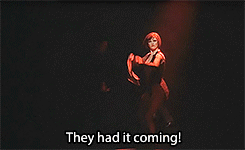
Uranus is righteous. Uranus is compelled to uphold values and beliefs for the greater good. Unlike Pluto, which destroys for the purpose of transforming, or Mars that destroys for the purpose of overcoming, Uranus destroys for the sake of what is considered right and fair. It will destroy in the name of truth and equity. It is the ultimate rebel and anti-authoritarion. It causes chaos in the face of resistance.
The house with uranus in it must act righteously, and the desired results must be righteous. Otherwise, volatility occurs.
1st house - You see the world differently and sometimes can't believe that you are forced to live in the constraints of society. Use your presence righteously to help others who are alienated.
2nd house - Spend money unselfishly. What you give to others will come back unexpectedly. Perhaps you don't even "believe in money," and you understand it as a created concept that keeps the poor suffering and the rich richer. You value unusual items and gifts.
3rd house - Others find it difficult to understand you and follow your chain of thoughts. You may get frustrated and exhausted by this, but you try to always speak your truth no matter what. Do this, and those who understand will love you. The ones that do not understand will be left behind. Use your words to advocate for others less fortunate in your community. The more you are involved in sibling drama, the worse it will get.
4th house - It's hard to find solid ground to call your home, but the more you hold onto the past is the more sudden and unexpected shake ups will occur. Practice empathy towards your family, and you will be truly empathetic to yourself.
5th house - Be respectful and kind in love. Do not fuck with others hearts, or it will come back around. Be open about the strangeness and taboos that you seek from the beginning. Sudden wins and loses in gambling. Unexpected accidents with children or pregnancy. Consider revolutionary ideas around these topics and how you can advocate for others in such positions.
6th house - You're compelled to fight authoritarian figures in your day and in your society because you hate being controlled. Step outside of the defensive fight and come up with your own routine and process without expecting others to agree to follow along.
7th house - Approach others with a fair and equal attitude. The more you celebrate the difference in others, the more it will be celebrated in you. You seek unusual partnerships and have open ideas about marriage, however, this must be actioned with consent.
8th house - Respect the property of others and do not fight over inheritance for selfish reasons. Embrace the sudden changes and loss. Fighting against it will cause more chaos.
9th house - Take ownership of your own learning. Your views and beliefs are against the norm and for the bettering of society. Just don't let your ego get so attached to your opinion that you close yourself off to learning. Otherwise, a greater force will have no choice but to continuously shake up your beliefs.
10th house - You are viewed by others as "different" or "strange." You should work to change society's perceptions, not to justify your strangeness, but to free others of stigma and discrimination.
11th house - You are the natural humanitarian. Its easy to get suddenly swept up in revolutionary ideas. Earn your money outside of the norm. Be careful when you dream strange and big for society. It must be with the purpose of benefiting those who need it, not just anarchy for the sake of defiance.
12th house - You have a strong hidden desire to break away and be free. You want to travel and explore alone. However, you can not avoid your generational karma. It follows you everywhere. The more open you are to understanding this, the more pleasant surprises will be delivered to you in unusual ways.
606 notes
·
View notes
Text

Meet Daniel and Chris Reyes, a devoted couple who spent years hoping to start a family of their own. Their journey began with many failed attempts at adoption and other pathways, culminating in an IVF procedure that finally changed their lives. Chris (wearing gray sweatpants), who always dreamed of carrying his children before stepping into the role of a father, discovered a groundbreaking fertility program that allowed male pregnancy via advanced IVF techniques. Despite warnings and logistical hurdles, he remained steadfast in his determination to experience both pregnancy and fatherhood firsthand.
By the time this photo was taken in 2003, the pair had already overcome countless obstacles—financial constraints, skepticism from relatives, and the emotional stress of repeated fertility treatments. Yet here they are, in the first moments with their newborn son, grinning through sheer disbelief and joy. Preferring a home birth, Chris and Daniel set up a cozy birthing suite in their bedroom, assisted only by Daniel’s calming presence and the steady guidance of their midhusband, a certified birth attendant specializing in male pregnancy. The atmosphere was intimate, quiet, and reverent—a stark contrast to the sterile, often frantic setting of a hospital.
#male pregnancy#mpreg belly#mpreg#mpreg kink#pregnantman#mpreg birth#mpreg ai#malepreg#mpregbirth#mpreglabor#gay
97 notes
·
View notes